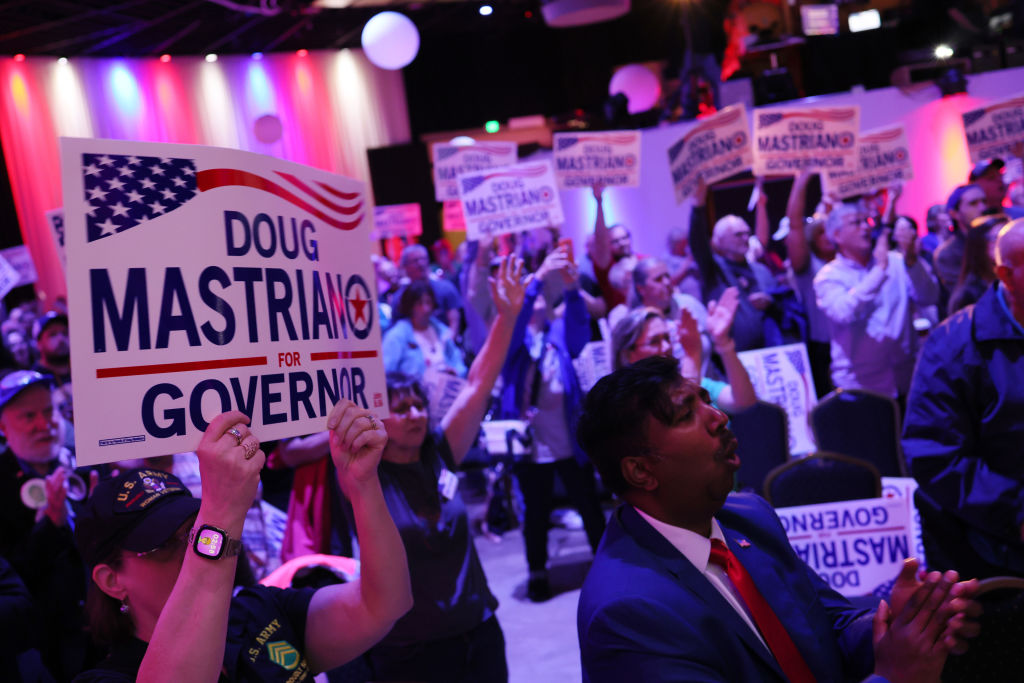Following Democrats’ midterm sweep of Pennsylvania’s open Senate and governor seats, Republican operatives, consultants, and elected officials across the state are frantically searching for someone to blame.
The primary targets are the Republican candidates themselves, both of whom were endorsed by former President Donald Trump and lost by wide margins in what’s normally a battleground state: Dr. Mehmet Oz, who lost the Senate seat by 5 points, and far-right state Sen. Doug Mastriano, a 2020 election-denier who lost the gubernatorial race by 14.
But many GOP county chairs and political operatives insist the party’s problem wasn’t just the candidates themselves. It was also the party’s unwillingness to squelch ultimately unelectable candidates and the support they got from the populist right. Now they’re urging state GOP leaders to consider new ways for nominating a competitive challenger to Democratic Sen. Bob Casey in 2024.
One solution is for the party to adopt a runoff system, whereby a candidate would have to secure a majority of votes to win the party nomination. Leaders at Commonwealth Partners Chamber of Entrepreneurs, a key player in Pennsylvania GOP politics, are already urging state party leaders and elected officials to consider the move in the primary election, The Dispatch has learned.
“The real problem is Pennsylvania’s election system that allows a minority faction to win a primary even though a majority of primary voters said they preferred someone else,” said Matt Brouillette, Commonwealth Partners’ founder, CEO, and president. “We are pushing for a runoff system that should minimize the potential for extremist candidates in both parties.”
Looming over both primary races this year was also Trump, who waited until April to endorse Oz and days before the May primary to endorse Mastriano.
Some Republican operatives knew Mastriano in particular stood little chance in the general election against Democrat Josh Shapiro, but blame the party for choosing not to do anything about it until it was too late. The GOP brass erred in not privately pressuring longshot candidates to drop out, they say, especially once it became clear that a large field would split the moderate vote and boost Mastriano.
But the party also refused to endorse candidates—an unusual move that demonstrated the fractures among Republican ranks.
Former state GOP chairman Rob Gleason called the decision a “mistake.” But he also acknowledged the troubles that state GOP Chairman Lawrence Tabas faced in this year’s primary environment, particularly in the gubernatorial race that at one point featured more than a dozen GOP candidates.
“There were so many candidates for governor it threw him off, and a lot of them were asking him not to endorse because if he endorsed, a lot of them would not have run,” said Gleason, under whose leadership the party made endorsements in every cycle for the 11 years he served.
In interviews, a number of county chairmen and state committee members who were in the room during the February voice vote cementing the no-endorsement decision said Tabas rushed the proceedings and left too little time for debate.
“It’s kind of a blur because it happened so quickly and it was a massive room,” said Jeff Piccola, former chairman of York County who resigned after the May primary over frustrations with the direction the state GOP was moving.
“I would have preferred to have an actual roll call vote instead of just yelling the loudest,” said Jim Vasilko, a state committee member. “When the people of the party don’t vote to endorse, then it’s easy to deflect the blame and say, ‘Well, we put it in the voters’ hands in the primary and they’re the ones to pick the candidate.’”
Knowing Mastriano’s likely electoral fate in November, Republican insiders scrambled to put together a last-minute plan to focus support for Lou Barletta, the Republican candidate who had for weeks polled in second place behind Mastriano.
It didn’t work. Mastriano got 44 percent of the primary vote, and establishment Republicans got a nightmare: a GOP gubernatorial nominee who couldn’t fundraise, win support from the Republican Governors Association, or pivot to a general election strategy.
Piccola said the debacle “demonstrated how weak the party was” in the face of Mastriano’s Trump-aligned supporters.
At that point, it became clear to establishment-type Republican insiders that there was little the party apparatus could do to help Mastriano cross the finish line. “He couldn't raise any money, he was too extreme, he was a denier,” Gleason said, attributing his primary win to the “cult following” he had among the far-right flank of the GOP. “He wasn’t gonna win. He ran a non-campaign, so it didn’t even matter what Shapiro did or what the issues were.”
Some say a party endorsement would have fueled anti-establishment candidates to run against the party’s preferred candidates. Still, the movement to hold party leaders accountable for not doing more to select better candidates is growing. The Philadelphia Inquirer reported days after the midterms that some state GOP insiders want to oust Tabas, though The Dispatch could not independently verify those discussions. (Tabas did not respond to The Dispatch’s requests for comment.).
As state GOP leaders plan their strategy for 2024, some elected officials are keeping the focus on logistical problems, like encouraging Republican voters to cast absentee and mail-in ballots. “We dropped the ball on the mail-in ballots,” said Jackie Kulback, the head of the Cambria County GOP and chair of the Southwest Caucus of Pennsylvania's Republican State Committee.
But a successful 2024 strategy also requires accountability from those at the top. As one county chair put it: “Whenever statewide you see this bloodbath, somebody needs to be held accountable.”







Please note that we at The Dispatch hold ourselves, our work, and our commenters to a higher standard than other places on the internet. We welcome comments that foster genuine debate or discussion—including comments critical of us or our work—but responses that include ad hominem attacks on fellow Dispatch members or are intended to stoke fear and anger may be moderated.
With your membership, you only have the ability to comment on The Morning Dispatch articles. Consider upgrading to join the conversation everywhere.